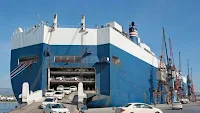The Tesla ship was compelled to depart from Australia due to a stink bug infestation. This infestation posed a significant risk to the local ecosystem and agricultural industry. The decision to leave was made in accordance with strict biosecurity regulations aimed at preventing the spread of invasive species.
A recent incident involving a ship carrying Tesla electric cars has sparked significant concern, leading to the vessel being turned away from Australia and forced to return to Shanghai. The reason behind this unexpected turn of events? The discovery of stink bugs on board, prompting government authorities to take swift action to protect Australian agriculture and wildlife from potential harm.
Vessel Details
The Glovis Caravel, with a reported capacity of 6500 vehicles, found itself at the center of this biosecurity issue. While the exact number of Tesla cars on board remains unclear, it is evident that the impact of this situation extends beyond the immediate logistical challenges.
Biosecurity Concerns
Reports indicate that despite an initial entry approval into Australia, the presence of live insects, including yellow spotted stink bugs, was subsequently identified. This led to the vessel's redirection back to Shanghai for thorough cleaning and processing before any potential re-entry into an Australian port.
Impact on Customers
For Australian customers eagerly anticipating their Tesla vehicles, this development has undoubtedly caused frustration and uncertainty. Tesla Australia has assured affected customers of their active pursuit of solutions to minimize the delivery delays. Options under consideration include reassigning orders to vehicles from the next production batch, with detailed updates expected in the coming week.
Severity of Situation
The Department of Agriculture, Fisheries and Forestry has underscored the severity of the situation, emphasizing the significant threat posed by the detected live insects to Australia's plant health and environment. The Yellow Spotted Stink Bug, in particular, has been highlighted for its potential to inflict damage on agricultural crops, fruit, and ornamental trees.
This incident is not the first time the Glovis Caravel has been embroiled in such a situation. In 2018, while transporting cars from Japan, it was compelled to depart from New Zealand waters after the discovery of a substantial number of stink bugs, further underscoring the recurring nature of this issue.
Tesla's Growth Trajectory
Amidst these developments, it is noteworthy that Tesla is poised to achieve record-breaking annual sales both in Australia and globally. With an anticipated delivery of close to 50,000 vehicles in Australia and a projected international delivery figure surpassing 1.8 million, the company's growth trajectory remains robust.
Anticipated Insights
As Tesla gears up to unveil its global delivery results on January 2, 2024 (US time), followed by the publication of Australian data on January 4, stakeholders eagerly await insights into the company's performance amidst these unforeseen challenges.
Summary
The intersection of biosecurity concerns and global supply chain dynamics has brought forth a complex scenario with implications for both Tesla and its customers. As this situation unfolds, stakeholders will closely monitor developments and anticipate the company's proactive measures to mitigate the impact on its operations and customer commitments.
(This article is sourced from drive.com.au and curated by Thetransporteronline24)




